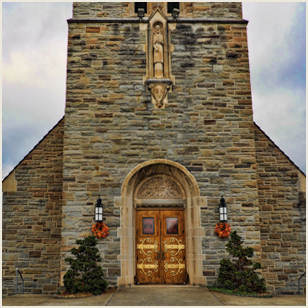Eucharist, Fulton Sheen (1895-1979), Page: Quotes, Quote Author, Quote Topic
Why did Our Blessed Lord use bread and wine as the elements of this Memorial? First of all, because no two substances in nature better symbolize unity than bread and wine. As bread is made from a multiplicity of grains of wheat, and wine is made from a multiplicity of grapes, so the many who believe are one in Christ. Second, no two substances in nature have to suffer more to become what they are than bread and wine. Wheat has to pass through the rigors of winter, be ground beneath the Calvary of a mill, and then subjected to purging fire before it can become bread. Grapes in their turn must be subjected to the Gethsemane of a wine press and have their life crushed from them to become wine. Thus, do they symbolize the Passion and Sufferings of Christ, and the condition of Salvation, for Our Lord said unless we die to ourselves we cannot live in Him. A third reason is that there are no two substances in nature which have more traditionally nourished man [and woman] than bread and wine. In bringing these elements to the altar, men [and women] are equivalently bringing themselves. When bread and wine are taken or consumed, they are changed into [one’]s body and blood. But when [Jesus] took bread and wine, He changed them into Himself.”
― Fulton J. Sheen, Life of Christ
Page: Quotes, Quote Topic, Spiritual (life)
There exists in our heart an interior land where we are alone, to which no one finds his way but God. This innermost, unfrequented chamber of our heart is really there – the only question is whether we ourselves avoid it foolishly… because no one and no familiar things of this earth can accompany us if we enter it.
–Karl Rahner (1904-1984)
Charity, Page: Quotes, Quote Topic, Spiritual (life)
If it were given to a man to see virtue’s reward in the next world, he would occupy his intellect, memory and will in nothing but good works, careless of danger or fatigue.
–Saint Catherine of Genoa (1447-1510)
Grace, Page: Quotes, Quote Topic
God gives us his light in an instant, allowing us to know all that we need to know. No more is given to us that is necessary in his plan to lead us to perfection. We cannot seek this light; it is given to us from God as he chooses.
–Saint Catherine of Genoa (1447-1510)
Discipleship, Page: Quotes, Quote Topic
Regard yourselves as ministers and servants, reflecting that you have more need to serve them than they have to be served by you. God could very well provide for them by other means even better than you.
–Saint Angela Merici (1474-1540)
Love (others), Page: Quotes, Quote Topic
Learn from our Lord who, while he was in this world, was as a servant, obeying the Eternal Father even unto death. And this is why he says: ‘I have been among you not as the one who is served, but as the one who serves’.
–Saint Angela Merici (1474-1540)

